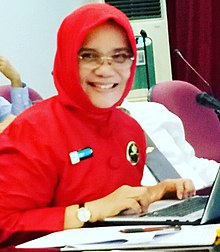Costly education: Maskoki
kindergarten pupils in Depok attend a class on Friday. In 2012 only
37.8 percent of children had access to preschool in Indonesia, despite
the government'€™s effort to increase the percentage to 72 percent by
2014. (JP/Yuli Tri Suwarni)
More than half of
children under the age of six have no access to early childhood
education, the Education and Culture Ministry says.
The
ministry'€™s early childhood, non-formal and informal education (PAUDNI)
director general, Lydia Freyani Hawadi, said on Thursday that in 2012
only 37.8 percent of children had access to preschool in Indonesia,
despite the ministry'€™s drive to increase the percentage to 72 percent
by 2014.
'€œWe acknowledge that we are facing tough challenges in fulfilling that target of 72 percent,'€ Lydia said.
However,
she said that the directorate general had successfully increased the
gross participation rate (APK) of children below six years old in
preschools to 37.8 percent from 34 percent in 2011.
Even though
preschool education is not compulsory in Indonesia, it is crucial for
the development of social, cognitive and motor skills of children,
education expert Arief Rachman Hakim said.
'€œA preschool
environment introduces children to social situations and teaches them
manners. It has an affect on the future lives of these children,'€
Arief told The Jakarta Post on Friday.
'€œIt is the most crucial time in one'€™s life,'€ he added.
Preschool
is not only essential to introduce children to literacy and numeracy
but it also makes them more confident in their abilities during
elementary school.
According to Lydia, the directorate suffered
from a lack of funding, which limited them from expanding the early
childhood education facilities throughout the country.
The
government allocated Rp 2.4 trillion (US$232.8 million) to early
childhood education this year. Lydia said the money would be used to
establish more preschools, improve the quality of teachers and educate
the public regarding the importance of early childhood education.
'€œWith
this amount, we can only develop 1,491 new preschools this year: Far
less than the government'€™s program to establish a preschool in every
village in Indonesia. As of 2012, there were 25,834 villages without
early childhood education institutions,'€ Lydia said. '€œAs such, with
funds at the current level, it would take around 15 years to
complete the program,'€ she added.
Lydia
said the ministry would not build new infrastructure, such as buildings
or classes, this year as the ministry aimed to up the gross
participation rate using existing public spaces.
'€œWe aim to
develop new preschools by utilizing existing public places, including
mosques, churches, temples and Posyandu,'€ Lydia said.
She said
it would only take around Rp 45 million to develop new preschools using
this method, much less than the Rp 300 million or so it would cost to
build a new building.
Separately, Ella Yulaelawati, the
ministry'€™s public education director under the PAUDNI directorate
general said that Indonesia had aimed to reduce the number of illiterate
people to 7.5 million by 2015, but by 2011, the country had surpassed
this goal and reduced the number to 6.7 million.
However, she
said that even though the country had exceeded the target nationally
34.5 percent of Papua residents are illiterate.
'€œWe will
concentrate our program more on improving literacy in Papua,'€ Ella
said. '€œBased on a study, an area with more than 30 percent of
illiterate residents is more prone to conflict,'€ she added.
Sumber: http://www.thejakartapost.com/news/2013/07/27/most-children-still-have-no-access-early-education.html
Tulisan Paling Sering Dibaca
-
JAKARTA, (PRLM).-Direktur Jenderal Pendidikan Anak Usia Dini, Nonformal dan Informal (Dirjen PAUDNI) Lydia Freyani Hawadi menuturkan,...
-
SURABAYA. Direktur Jenderal Pendidikan Anak Usia Dini, Nonformal dan Informal (Ditjen PAUDNI) Prof. Dr. Lydia Freyani Hawadi, Psi menek...
-
Oleh: Dr. Pudji Astuty, S.E.,M.M | Ketua Program Magister Manajemen Universitas Borobudur Kala tahun 1995 Pascasarjana Magister Manajemen...
-
Para orang tua dan guru Taman Kanak-Kanak (TK) tidak boleh memarahi anak-anak yang sering bertanya. Sebab, hal tersebut merupakan salah sa...
Kategori
- Berita (516)
- Insight (103)
- Kata Mereka (85)
- Narasumber (74)
- Antologi (58)
- Wisata (32)
- Wawancara (20)
- Makalah (17)
- Curhat (13)
- Kegiatan (10)
- Buku Kaleidoskop 2013 (7)
- Keluarga (4)
- Konsultan Perkawinan (3)
- Buku (2)
- Artikel dan Makalah (1)
Arsip Tulisan
- Maret (12)
- Maret (3)
- Februari (20)
- Januari (18)
- Oktober (26)
- September (2)
- Agustus (25)
- Juli (24)
- Juni (26)
- Maret (9)
- Desember (44)
- November (9)
- Januari (46)
- Juli (12)
- Juni (7)
- Desember (2)
- November (17)
- Oktober (48)
- September (48)
- Agustus (50)
- Juli (70)
- Juni (26)
- April (51)
- Maret (47)
- Februari (46)
- Januari (41)
- Desember (17)
- Oktober (164)
- September (11)






